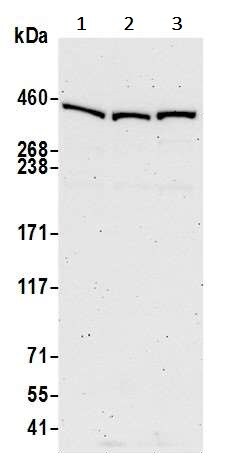Anti-Sacsin antibody (ab242224)
Key features and details
- Rabbit polyclonal to Sacsin
- Suitable for: WB, IP
- Reacts with: Human
- Isotype: IgG
Overview
-
Product name
Anti-Sacsin antibody
See all Sacsin primary antibodies -
Description
Rabbit polyclonal to Sacsin -
Host species
Rabbit -
Tested Applications & Species
See all applications and species dataApplication Species IP HumanWB Human -
Immunogen
Synthetic peptide within Human Sacsin aa 4529-4579. The exact sequence is proprietary.
Database link: Q9NZJ4 -
Positive control
- WB: HeLa, HEK-293T and Jurkat whle cell lysates. IP: Sacsin IP in Jurkat whole cell lysate.
Properties
-
Form
Liquid -
Storage instructions
Shipped at 4°C. Store at +4°C short term (1-2 weeks). Upon delivery aliquot. Store at -20°C long term. Avoid freeze / thaw cycle. -
Storage buffer
pH: 7
Preservative: 0.09% Sodium azide
Constituent: Tris citrate/phosphate
pH 7 to 8 -
 Concentration information loading...
Concentration information loading... -
Purity
Immunogen affinity purified -
Purification notes
Antibody was affinity purified using an epitope specific to Sacsin immobilized on solid support. -
Clonality
Polyclonal -
Isotype
IgG -
Research areas
Images
-
All lanes : Anti-Sacsin antibody (ab242224) at 0.4 µg/ml
Lane 1 : HeLa (human epithelial cell line from cervix adenocarcinoma) whole cell lysate
Lane 2 : HEK-293T (human epithelial cell line from embryonic kidney transformed with large T antigen) whole cell lysate
Lane 3 : Jurkat (human T cell leukemia cell line from peripheral blood) whole cell lysate
Lysates/proteins at 50 µg per lane.
Developed using the ECL technique.
Predicted band size: 521 kDa
Exposure time: 3 minutesLysates prepared in NETN buffer.
-
Sacsin was immunoprecipitated from Jurkat (human T cell leukemia cell line from peripheral blood) whole cell lysate (1 mg for IP, 20% of IP loaded) with ab242224 at 6 µg/reaction.
Lysates prepared in NETN buffer.
All lanes : Anti-Sacsin antibody (ab242224) at 1 µg/ml
Lane 1 : ab242224 IP in Jurkat whole cel lysate
Lane 2 : Control IgG IP in HEK-203T whole cell lysate.
Developed using the ECL technique.
Exposure time: 30 seconds













